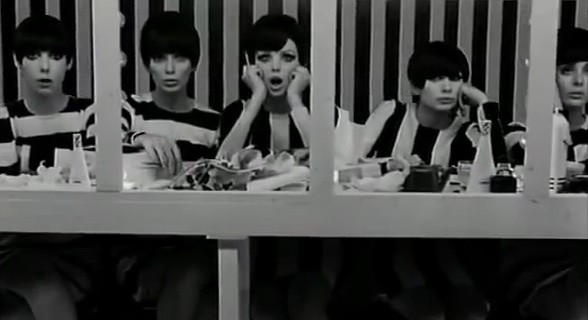
William Klein is not widely known in the United States, but he's a a filmmaker's filmmaker, adored by cinephiles and art critics for his use of social commentary and surrealism. Touching upon topics such as materialism, war, Imperialism, and government surveillance, Klein's films contain the potent satire of a Kubrick film and without the flashy stylistic pizzazz of Godard's New Wave (another French contemporary whose work surely overshadowed Klein's in the '60s).
Klein's films will be highlighted every Monday night in December at Hibbleton Gallery in Fullerton. Described here as “delirious fictions,” Hibbleton Gallery's own filmmaker-in-residence Steve Elkins will offer his usual screening-cum-lecture-cum-discussion. And, like all screenings at the gallery, each film is FREE!
]
Born in New York, Klein went on to study under famed abstract artist Fernand Léger in Paris in the 1940's. Léger would inform Klein's future careers as artist, photographer and filmmaker by instilling in Klein a strong aversion to conformity in art practice; Klein carried Léger's banner and created geometric, Mondrian-esque abstract paintings, later giving way to stunning black-and-white street photography that included high contrasts, blurry figures and wide angles (Léger often stressed the streets as the space for art, and not galleries or art museums).
Somehow, Klein snagged a contract photographing models in New York in the mid-1950s and controversially photographed his models as abstract, unfeminine figures that subverted the era's typical image of fashion photography. He wouldn't return to photography until the mid '80s, but in between Klein returned to Paris and began making films. Much of Hibbleton's film series touches on his 'delirious fictions' –films with a sharp political commentary told with an absurdist, surrealist twist– as well as his early documentaries.
Here's a weekly schedule of what to expect throughout the month:
December 1st: Ballet Mechanique: A proper look at Léger's influence with a screening of his 1924 Dadaist experimental venture with Man Ray and Ezra Pound.
Who Are You, Polly Magoo? (1966) arguably Klein's most well-known film, delving into the fashion industry and its world of excess, consumer culture, and “the restructuring of the female body,” according to Elkins.
December 8: Mr. Freedom (1969): American superhero Mr. Freedom travels to third-world France where his message of capitalism, foreign policy and other all-American values clash with the region's radical left-leaning communists.
December 15: The Model Couple (1977): A random, white middle class couple is selected by the government to be placed in a fully surveilled environment where they live for the entertainment and observation of the public on television.
December 22: Zazie Dans Le Metro (1970): Precocious Zazie lives by taking in the streets of Paris as her personal playground, thumbing her nose at adults and society. Elkins swears Wes Anderson's movie aesthetic takes from Zazie, but will never make a film this good.
December 29: the documentaries of William Klein: Klein's doc filmography includes a look at exiled Black Panther Eldridge Cleaver living in Algiers, Muhammad Ali, Little Richard, and the Pan-African Festival.
For more information on the films and other happenings at Hibbleton Gallery, visit and 'Like' them on Facebook. Check out the William Klein film series Facebook page here as well.
Email: am******@oc******.com Twitter: @aimee_murillo Follow OC Weekly on Twitter and Facebook!
Aimee Murillo is calendar editor and frequently covers film and previously contributed to the OCW’s long-running fashion column, Trendzilla. Don’t ask her what her favorite movie is unless you want to hear her lengthy defense of Showgirls.

